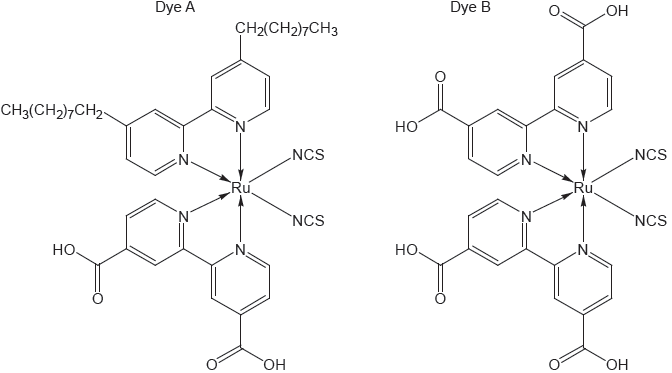| Date | May 2018 | Marks available | 2 | Reference code | 18M.3.hl.TZ1.15 |
| Level | HL | Paper | 3 | Time zone | TZ1 |
| Command term | State | Question number | 15 | Adapted from | N/A |
Question
Photovoltaic cells are much less hazardous than nuclear fission.
Early photovoltaic cells were based on silicon containing traces of other elements. State the type of semiconductor produced by doping silicon with indium, In, giving a reason that refers to its electronic structure.
Dye-sensitized solar cells, DSSCs, use a dye to absorb the sunlight. State two advantages that DSSCs have over traditional silicon based photovoltaic cells.
The structure of two dyes used in DSSCs are shown.

Predict, giving a reason, which dye will absorb light of longer wavelength.
Markscheme
p-type AND has 3 «valence» electrons
OR
p-type AND fewer electrons «than silicon»
Do not accept “it is in group 3/13” as reason.
[1 mark]
Any two of:
cheaper
OR
ease of fabrication
use light of lower energy/lower frequency/longer wavelength
absorb wider range of wavelengths
dye converts most/all absorbed photons into electrons
plentiful /renewable resources «to construct DSSC cells»
operate at lower «internal» temperatures/better at radiating heat away «since constructed with thin front layer of conductive plastic compared to glass box in photovoltaic cell»
use of nanoparticles provides large surface area exposure to sunlight/sun/light
can absorb better under cloudy/low light conditions
better conductivity
more flexible
[2 marks]
B AND has greater/more «extensive» conjugation
Accept “more alternating single and double bonds”.
[1 mark]

